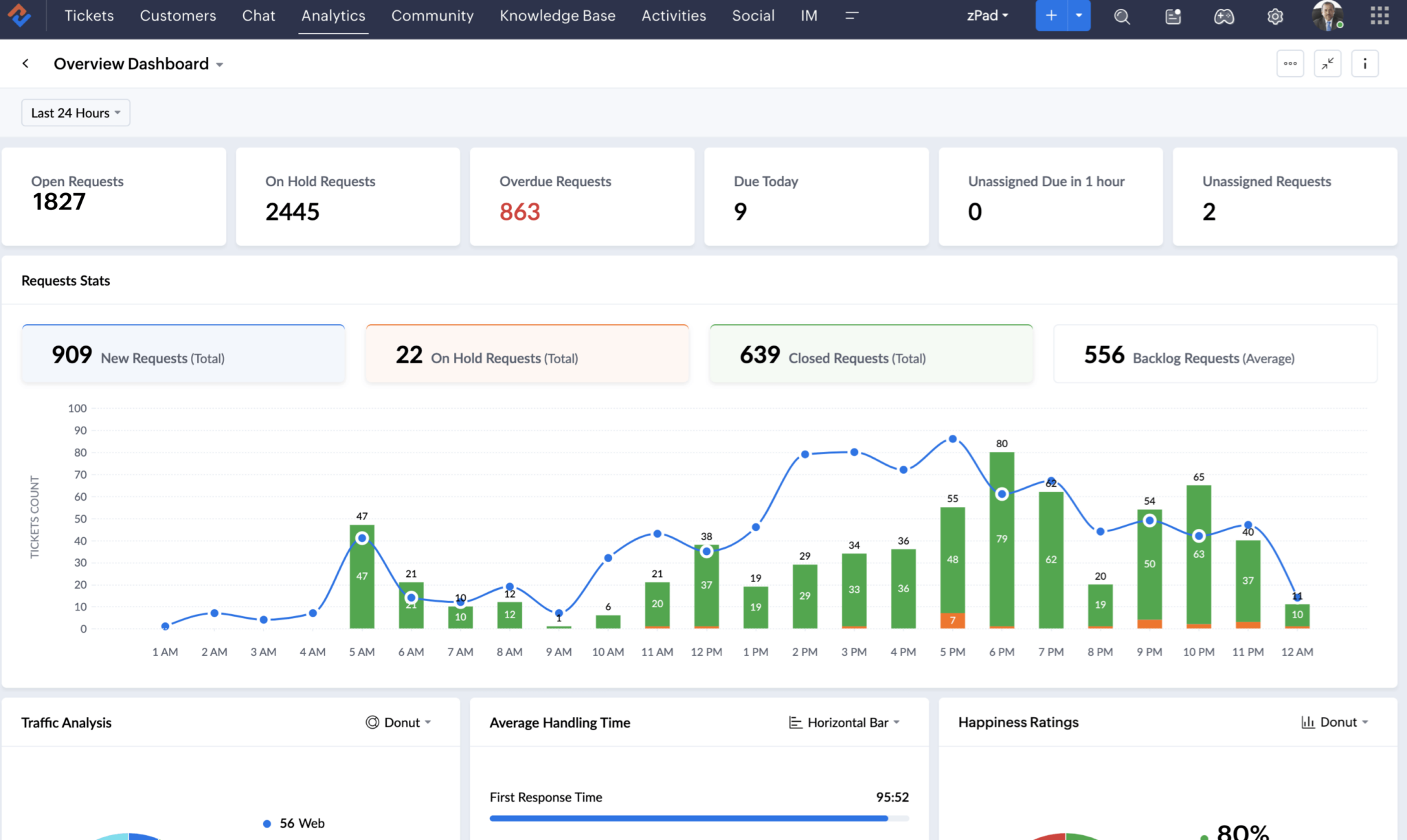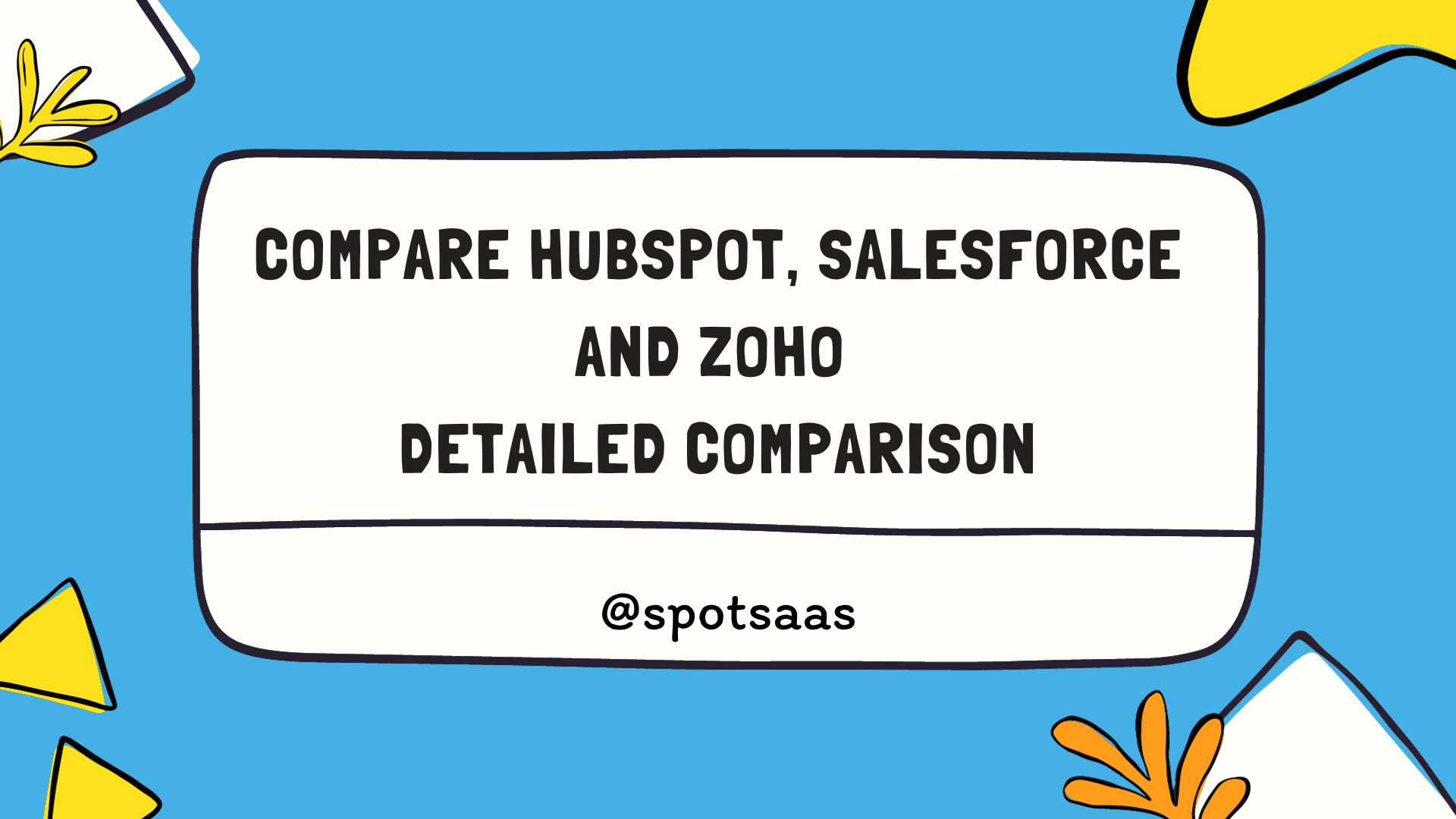Deciding on the perfect Customer Relationship Management (CRM) system for your business can feel a bit like standing at a crossroads. HubSpot, Salesforce, and Zoho each beckon with promises of streamlined operations and deep customer insights.
It’s not surprising you might be feeling lost! Interestingly enough, in 2019 Salesforce held court over nearly 19% of the market due to its highly customizable solutions. But does this ensure it’s right for you?
In this blog post, we’re going to roll up our sleeves and dive deep into these powerhouse CRM platforms—evaluating their key features, awesome benefits, and pricing structures—to help guide your way forward.
Key Takeaways
- HubSpot offers robust marketing automation tools, making it great for small businesses looking to streamline their marketing campaigns.
- Salesforce is highly customizable and scalable, ideal for enterprise-level companies in need of advanced contact management, reporting, sales enablement, and team collaboration solutions.
- Zoho CRM provides an affordable option with comprehensive contact management features similar to Salesforce but with more limited marketing and automation functionalities.
Overview of HubSpot, Salesforce, and Zoho CRM
In the thriving world of business, CRM tools have become indispensable companions that help companies navigate through client interactions, nurture customer relationships and turbocharge sales.
The three big names in this space – HubSpot, Salesforce and Zoho CRM – each offer a unique set of perks tailored to meet diverse needs.
Let’s kick things off with HubSpot. This platform is like that friendly colleague who always has your back. It offers an intuitive interface brimming with features designed for marketing automation and is especially great for small businesses just finding their feet.
With HubSpot, you can create new deals as easily as brewing a cup of coffee while maintaining up-to-date company records without breaking a sweat. Its standout feature? An automated service that keeps operations running smoothly while giving you all the juicy details about your latest customer history.
Next at bat, we have Salesforce – it’s pretty much the athlete on steroids in the industry! Backed by its mammoth market share because of its superb customizability, this one’s got just what you need to take your business to new heights.
Born in sunny California from an Oracle employee’s vision two decades ago, this enterprise titan offers comprehensive solutions including contact management and reporting tied neatly together with team collaboration tools.
And finally, there’s Zoho CRM sitting comfortably in our lineup offering affordability akin to finding designer jeans at thrift store prices yet packing quite a punch itself when it comes to robustness appreciated particularly by budget-conscious enterprises.
Unlike Hubspot or Salesforce which are like Swiss army knives packed with all sorts of bells and whistles, Zoho primarily hones on pure CRM functionality making it more straight-shooter than Show Pony but no less effective.
The beauty lies in diversity here: each one among these platforms brings something different to the table then again choice should be grounded on how well they align with your organization’s unique needs.

Key Features and Benefits
HubSpot offers robust marketing automation tools, allowing businesses to create and manage targeted campaigns, track leads, and optimize content for better performance. Salesforce provides advanced sales automation features like lead management, opportunity tracking, and sales forecasting.
Zoho CRM offers comprehensive service automation capabilities including ticket management, customer self-service portals, and case escalation workflows.
Marketing Automation
Marketing automation stands out as a crucial feature for businesses seeking to optimize time and resources. This function enables companies to automate repetitive tasks, such as email marketing, social media posting, and even ad campaigns.
| Platform | Marketing Automation | Customization & AI | Affordability | Data Reporting |
|---|---|---|---|---|
| HubSpot | Excellent – Highly personalized workflows | Good | Varies | Robust |
| Salesforce | Good | Excellent – Extensive customization & AI for predictive insights | Varies | Robust |
| Zoho | Limited functionality | Limited | Good – More affordable | Robust |

Sales Automation
Sales automation plays a critical role in streamlining the sales process, allowing your team to focus on what they do best – closing deals. With HubSpot CRM, you can automate mundane tasks like scheduling meetings and logging emails.
You can also leverage its robust reporting feature for forecasting sales and tracking performance. Salesforce takes it up a notch with advanced functionalities such as lead scoring, opportunity management, and contract handling.
These features make Salesforce an enterprise solution that accelerates efficiency while reducing manual efforts. Zoho isn’t far behind either; it offers useful features like workflow automation, email integration, and predictive analytics to support your sales team effectively.
In essence, all three CRM platforms empower businesses with tools needed for effective Sales Enablement through various degrees of automation capabilities tailored to meet different business needs.

Service Automation
Service automation is a crucial aspect of any CRM system. It allows businesses to streamline their customer service processes, ensuring efficient and timely responses to customer inquiries and issues.
With HubSpot CRM, users can automate various service-related tasks, such as creating support tickets, assigning them to the appropriate team members, and tracking progress until resolution.
Salesforce also offers robust service automation capabilities with features like case management, automated routing of customer requests, and self-service portals for customers to find solutions on their own.

Plans and Pricing Comparison
When it comes to plans and pricing, HubSpot, Salesforce, and Zoho CRM offer various options tailored to different business needs. From free versions to basic and advanced plans, each platform provides flexibility in terms of features and costs.
Read on to discover the best option for your business!
Free options
| Platform | Free Option | Key Features | Duration/Usage Limit | Suitability |
|---|---|---|---|---|
| HubSpot | Yes | Contact management, deal tracking, customer history, automated and updated information | No time limit specified | Businesses requiring essential CRM features |
| Salesforce | Yes (Trial) | Customizable and scalable CRM solutions | 30-day free trial | Businesses exploring customizable CRM options |
| Zoho CRM | Yes | Basic CRM functionalities | Forever free for up to 3 users | Small businesses or startups |
Basic plans
The basic plans offered by HubSpot, Salesforce, and Zoho CRM provide a solid foundation for businesses looking to manage their contacts and sales processes. HubSpot’s basic plan offers features such as contact management, deal tracking, and email integration.
Salesforce’s basic plan includes account and contact management, lead scoring, and opportunity tracking. Zoho’s base CRM provides contact management, lead generation tools, and email marketing capabilities.
These basic plans serve as an affordable entry point for small businesses looking to streamline their sales activities without overwhelming them with complex functionalities or high costs.
Advanced plans
HubSpot, Salesforce, and Zoho all offer advanced plans for businesses that require more robust CRM functionalities. These advanced plans provide additional features and capabilities to enhance sales automation, marketing automation, and service automation.
With HubSpot’s advanced plan, users can access more customization options and integrations to optimize their CRM workflows. Salesforce’s advanced plan offers extensive scalability and customization options suitable for enterprises seeking enterprise-grade solutions.
Zoho’s advanced plan provides comprehensive tools for contact management, reporting, and team collaboration at an affordable price point. Users can choose the CRM platform that best aligns with their business needs when opting for these advanced plans.
Pros and Cons of Using HubSpot, Salesforce, and Zoho CRM
Choosing a CRM platform that suits your business needs can be a challenging endeavor. Let’s dig into the pros and cons of using HubSpot, Salesforce, and Zoho CRM.
| CRM Platform | Pros | Cons |
|---|---|---|
| HubSpot | HubSpot allows users to create new deals, company records, and customer history within the software, offering automated and up-to-date information. Additional features such as marketing and automation make it a versatile choice. | HubSpot may not be as comprehensive as Salesforce for contact management, reporting, sales enablement, and team collaboration. It can be a costlier option for small businesses. |
| Salesforce | Salesforce, as the largest CRM company globally, provides highly customizable and scalable solutions, making it suitable for enterprises. Its comprehensive solutions for contact management, reporting, sales enablement, and team collaboration make it a market leader. | Salesforce’s extensive customization might require a steep learning curve and can be costly for small businesses. |
| Zoho | Zoho provides an affordable option for businesses needing a CRM solution. It offers comprehensive contact management, reporting, sales enablement, and team collaboration features similar to Salesforce. | Zoho’s base CRM focuses more on pure CRM functionality, with limited marketing and automation features compared to HubSpot. |
These pros and cons should be considered in relation to your business needs. Not every company will need every feature, and the right decision will reflect the specific needs of your business.
Conclusion
In conclusion, when comparing HubSpot, Salesforce, and Zoho CRM, it’s important to consider the specific needs of your business. While Salesforce offers highly customizable solutions for enterprise-level companies, Zoho provides an affordable option with basic CRM functionality.
Meanwhile, HubSpot stands out for its additional marketing automation features. Ultimately, the best choice depends on your budget and the specific functionalities that are essential to your business’s success.
Frequently Asked Questions
Which CRM software is better: HubSpot, Salesforce, or Zoho?
The best CRM software depends on your specific business needs and requirements. It’s important to evaluate features, pricing, and customer reviews before making a decision.
What are the key features of HubSpot?
HubSpot offers various features such as contact management, email marketing automation, sales pipeline tracking, analytics reporting, and integration with other tools.
What are the key features of Salesforce?
Salesforce provides features like lead management, opportunity tracking, sales forecasting, customer support ticketing system, customizable dashboards and reports.
What are the key features of Zoho?
Zoho offers features like contact management, lead generation and nurturing tools,email marketing capabilities,sales automation workflows,and social media integration.
How much do these CRM software cost?
The cost of HubSpot,Salesforce,and Zoho CRM varies depending on the package selected.The prices can range from free versions to monthly subscriptions starting at $12 per user or higher for more advanced plans.It’s recommended to check their websites for detailed pricing information.




